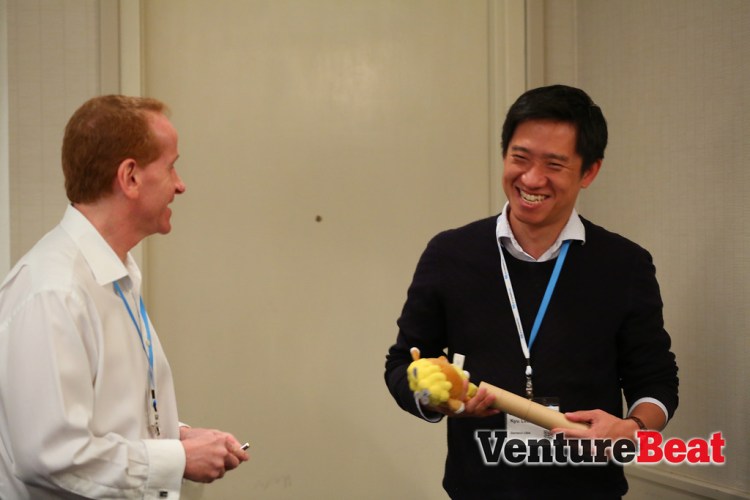REDWOOD CITY, Calif. — At one point this year, GungHo Online Entertainment’s Puzzle & Dragons was making $3.75 million a day — it’s practically a license to print money. And a gigantic slice of that money comes from Japan.
So it’s no surprise that mobile-game developers in the West want to break into this market. Representatives from Unity Technologies, Klab America, RenRen Games, and Gamevil USA dished out some tips during the “How to Make the Next Billion-Dollar Mobile Game in Asia” breakout session at GamesBeat 2013 on Wednesday.
And it goes beyond “don’t try” (unless you want to bring a platform to China — RenRen Games’ Hans Kim says no to that).
Tip No. 1: Find a partner
Klab America chief executive officer Noby Ota stresses the importance of making a deal to work with another company to get your game into China, Japan, or South Korea, not going about it on your own.
“If you have a good idea, find a good partner on monetization,” Ota said. And when it comes to getting a game to pop in Japan, Ota said that you just don’t need social mechanics — your game must be social in the game, like guild-on-guild combat.
Tip No. 2: Iterate, iterate, iterate
Console-game developers will often talk about sequels and yearly releases as “iterations.” But if you updated your game so slowly in a market like South Korea, you’d be in big trouble. Gamevil USA president Kyu Lee said frequent updates enable gamemakers to increase special in-game events that draw in players — and helps make them daily active users (DAUs). This also helps publishers and developers target areas where revenue is down, adding in events and other things that could help boost those numbers.
And Android gaming is a benefit for this — it’s much easier to get updates on Google Play than on iOS.
“You can iterate faster because of Android,” Lee said.
Tip No. 3: Dialing down, dialing up
This has nothing to do with making phone calls. It’s about adapting mechanics for markets. Again, the panel cited Puzzles & Dragons as an example. While it’s the hottest game in Japan, it’s just not catching on in the U.S. Ota thinks he knows one reason — it’s just too complicated for American players, who aren’t conditioned for its mechanics and monetization in the same manner that Japanese players are.
“At a certain stage, you have to spend money and think of a strategy,” Ota said. So to be successful, the panel agreed, Asian games should consider “dialing down” — making their games easier to understand and play for American audiences. Ota noted that turning a hardcore game into a midcore game is a good way to accomplish this.
The opposite applies to bringing a game to Asia — it may be not complicated enough to work for the Japanese or South Korean audiences, who may not even be used to tutorials in their games.
Tip No. 4: Grow organically
Unity Technologies vice president of Asia John Goodale has decades of experience in the game industry, and he learned much about working with Asian markets during his time with Sega. He brought the “start small” model with him when Unity set up shop in Asia.
“We had one person in Asia — me,” Goodale said. “Now we have four offices, 65 staff. We let the business feed itself.”
Tip No. 5: China is different than any other market
The mobile game scene may be more fragmented than any other in the world. Kim, the VP of business development and legal for Renren Games, pointed out that unlike in the U.S., where you’re dealing with two app stores (Apple’s and Google’s — and Amazon’s if you’re being charitable), you’ve got 10 to 15 (or even more) in China.
And it gets more complex after that. In China, you have even more “middlemen” — in addition to these marketplaces, you have networks selling games, deals to cut with telecom companies, and even negotiations with hardware manufacturers (China is a huge market for low-end cellphones, and getting your game preinstalled on such devices is a huge advantage).
VentureBeat's mission is to be a digital town square for technical decision-makers to gain knowledge about transformative enterprise technology and transact. Learn More

